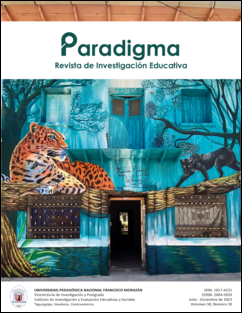Reflections on Public Innovation: A Review of "Evidencias MineduLAB de Perú"
DOI:
https://doi.org/10.5377/paradigma.v30i50.17092Keywords:
public innovation, scaling, experiments, institutional recognition, evidenceAbstract
The purpose of the article was to identify the factors that explain the low scaling of innovations in MineduLAB in Peru. The methodology had a qualitative approach, the design systematized a critique of innovations with results, identifying common and particular characteristics that allowed postulating the factors that explain the low scaling of innovations. Among the results, an innovation cycle without incentives was identified, with dispersed interests; the innovation cycle is also vulnerable to institutional and political instability; there is limited user participation in the process; it has limited results that remain as small experiences; and there is weak leadership. From the above, it has been possible to conclude that public innovation is undervalued and does not always scale up, despite obtaining results in pilot projects. Finally, it is concluded that the role of a server and modern leader with the ability to take risk, adaptable to change, but above all to understand innovation as part of achieving results and not as extra work, is essential.
Downloads
561
Downloads
Published
How to Cite
Issue
Section
License
Copyright (c) 2023 Universidad Pedagógica Nacional Francisco Morazán

This work is licensed under a Creative Commons Attribution-NonCommercial-NoDerivatives 4.0 International License.
Transfer of Copyright
- The author, when sending the work, states that it is his will to give the Universidad Pedagógica Nacional Francisco Morazán the patrimonial rights that correspond to him as the author of his work.
- The rights here assigned include all economic rights (Reproduction, transformation, public communication and distribution) and are given without limitation in terms of territory; This Assignment is given for the entire duration term established in the current legislation in Honduras.
- The cession of the aforementioned rights does not imply the cession of moral rights over it, because in accordance with the provisions of the Copyright and Related Rights Law, Chapter II, of the Moral Rights, Article 34, Article 25 , these rights are inalienable, imprescriptible, indefeasible and inalienable.
- The research work or document must be original and have been done without violating or usurping rights of third parties, therefore, the work is exclusively authored and owns the same.
- In the case of any claim or action by a third party, as to copyright on the work in question, the author must assume full responsibility for the rights assigned.
- Upon completion of the Rights Assignment Form, the author states that the work has not been published in another way, that the rights on the work have not been assigned and that no encumbrance or limitation on their use or use is imposed on them.





